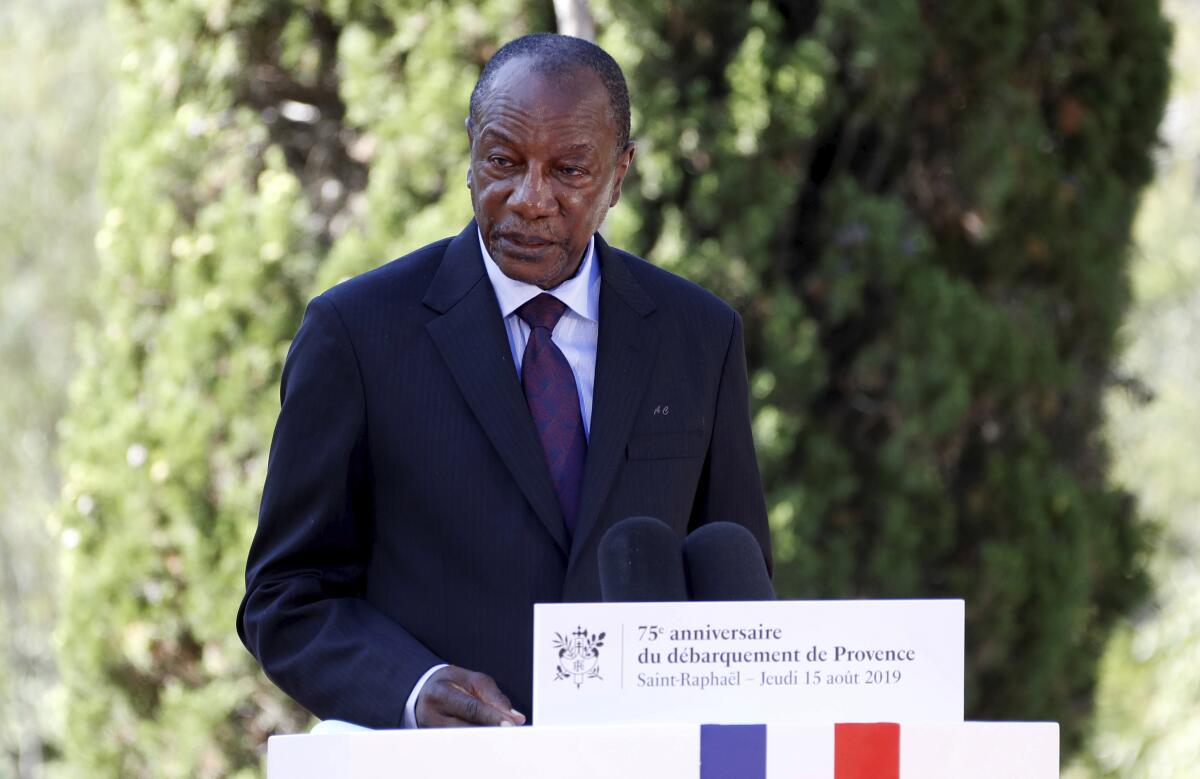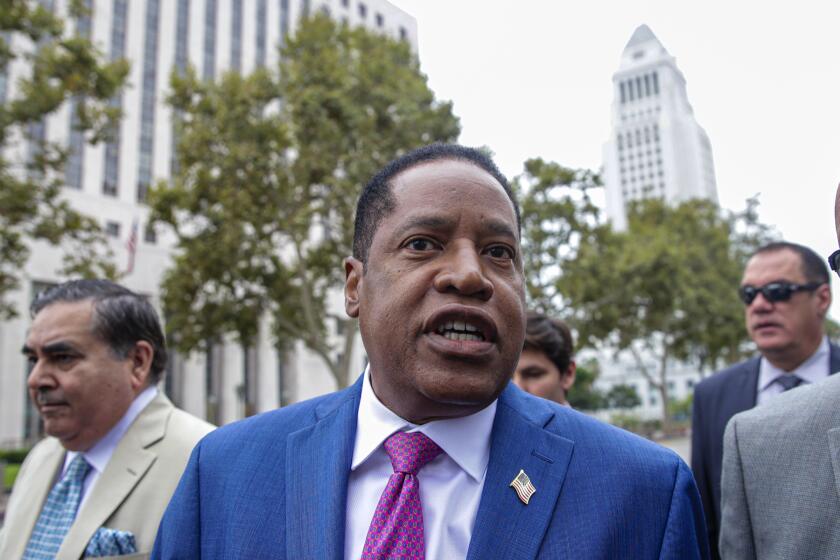Soldiers claim to have dissolved Guinea government in coup

- Share via
CONAKRY, Guinea — Mutinous soldiers in the West African nation of Guinea detained President Alpha Conde on Sunday after hours of heavy gunfire rang out near the presidential palace in the capital, then announced on state television that the government had been dissolved in an apparent coup d’etat.
The country’s borders were closed and its constitution also was declared invalid in the announcement read aloud on state television by army Col. Mamadi Doumbouya, who told Guineans: ““The duty of a soldier is to save the country.”
Conde’s whereabouts had been unknown for hours after the intense fighting Sunday in downtown Conakry until a video emerged showing the 83-year-old leader tired and disheveled in military custody. It was not immediately known when or where the video was taken, though a soldier’s voice can be heard asking Conde whether the putschists had harmed him in any way.
Doumbouya, the commander of the army’s special forces unit, later addressed the nation from state television headquarters, draped in a Guinean flag with about a half dozen other soldiers flanked at his side.
“We will no longer entrust politics to one man; we will entrust it to the people,” Doumbouya said, without mentioning Conde by name or where he was being held.
He later confirmed to France 24 television that Conde was in a “secure spot” and had seen a doctor.
A former U.S. diplomat in Conakry confirmed to the Associated Press that the president had been taken into custody by the putschists. The diplomat, who was in contact with Guinean officials, spoke on condition of anonymity due to the sensitivity of the matter.
As a talk radio host, California recall candidate Larry Elder called Donald Trump’s victory in 2016 ‘divine intervention.’ Now he sounds more tepid about the former president.
Conde, in power for more than a decade, had seen his popularity plummet since he sought a third term last year, saying that term limits did not apply to him. Sunday’s dramatic developments underscored how dissent had mounted within the military as well.
However, it was not immediately known how much support Doumbouya actually had within the military and whether forces loyal to Conde might try to retake power in the coming hours and days. In Sunday’s speech, Doumbouya called on other soldiers “to put themselves on the side of the people” and stay in their barracks.
Doumbouya said he was acting in the best interests of the nation, citing a lack of economic progress by leaders since the country gained independence from France in 1958.
“If you see the state of our roads, if you see the state of our hospitals, you realize that after 72 years, it’s time to wake up,” he said. “We have to wake up.”
Observers, though say the tensions between Guinea’s president and the army colonel stemmed from a recent proposal to cut some military salaries.
Heavy gunfire had erupted early Sunday near the presidential palace and went on for hours, sparking fears in a nation that already has seen multiple coups and presidential assassination attempts. The Defense Ministry claimed that the attack had been repelled by security forces, but uncertainty grew when there was no subsequent sign of Conde on state television or radio.
In 2010, Conde had won the country’s first democratic election since independence from France. Many saw his presidency as a fresh start for the country, which has been mired by decades of corrupt, authoritarian rule.
Opponents, though, say he has failed to improve the lives of Guineans, most of whom live in poverty despite the country’s vast mineral riches, which include bauxite and gold.
The following year Conde narrowly survived an assassination attempt after gunmen surrounded his home overnight and pounded his bedroom with rockets. Rocket-propelled grenades also landed inside the compound and one of his bodyguards was killed.
Violent street demonstrations broke out last year after Conde organized a referendum to modify the constitution. The unrest intensified after he won the October election, and the opposition said dozens were killed during the crisis.
Guinea has had a long history of political instability since independence. In 1984, Lansana Conte took control of the country after the first post-independence leader died. He remained in power for a quarter century until his death in 2009.
A second coup soon followed, leaving army Capt. Moussa “Dadis” Camara in charge. He later went into exile after surviving an assassination attempt, and a transitional government later organized the landmark 2010 election won by Conde.
More to Read
Sign up for Essential California
The most important California stories and recommendations in your inbox every morning.
You may occasionally receive promotional content from the Los Angeles Times.











